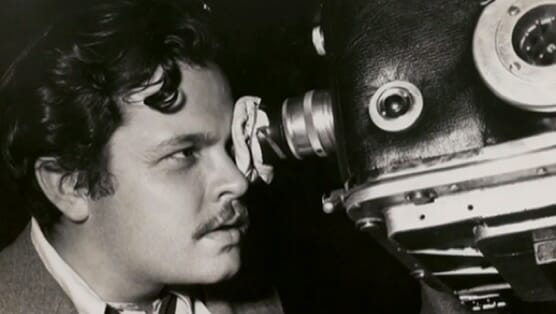
The life and work of Orson Welles was pretty astonishing. That one sentence sums up the (too obvious) thesis behind Magician: The Astonishing Life and Work of Orson Welles, Chuck Workman’s new documentary about the giant of stage and screen. Besides his five decades as an actor and director of radio, on Broadway and in movies, Welles actually worked as a magician here and there to pay the bills and raise money for charity. Yet the film only touches on this aspect of his career, throwing in a few clips of him doing tricks with little to no explanation why this towering figure performed such magic in Vegas or on I Love Lucy.
Workman certainly knows how to edit together archival material—he’s the editor of those signature movie montages that punctuate the Academy Awards broadcasts (and an Oscar winner himself, for a 1986 short film). The problem here is that he doesn’t have much to say, merely presenting the facts of a fairly well-known story with little depth or insight. To the degree that Magician works is largely due to its subject matter. Welles is utterly fascinating, and his impact on movies is monumental. Workman’s film basically starts on cruise control with its subject and lets Welles do the work rather than do much to be an interesting film in its own right.
Of course, to the uninitiated and to those who might have even seen Citizen Kane, the documentary is a more-than-passable introduction to his astonishing life and work—but ultimately it feels like a glorified Wikipedia entry. What the film does well is present motion picture footage that endures as a testament to the auteur’s genius. While Welles wasn’t a cinematographer himself, his films were characterized by stunning shot compositions (usually in black and white, as he only worked in color very late in his career) and use of sound.
Simply put, from Citizen Kane and The Magnificent Ambersons to Othello and The Lady From Shanghai to Touch of Evil and The Trial, Welles was responsible for some of the most amazing images in the history of cinema. It’s pretty hard to not come away from Workman’s film with a deep appreciation for Welles’ contribution to the craft, even if the audience doesn’t gain much understanding of the origins of this talent. Magician mentions Welles’ youth—he was a musician as a child and an accomplished Shakespearean actor in his teens—but there is little to suggest the genesis of his flair for the visual arts.
The vast bulk of the film is comprised of clips from Welles’ filmography, in addition to archival interviews with associates long since gone: Charlton Heston, John Houseman, Robert Wise and Anthony Perkins. Even the interviews with living directors Henry Jaglom, Steven Spielberg and Martin Scorsese are old. Workman does have some newer, possibly even original, material that includes great contributions from the always engaging critic Elvis Mitchell, Welles’ biographer and actor-director Simon Callow, two of Welles’ three daughters and some surviving schoolmates. In an agonizingly embarrassing sequence that honors Welles at the Illinois theater where he first took the stage, a group of former classmates raise glasses of bubbly and cheer, “Rosebud!”
Similarly, Workman includes, you guessed it, a clip compilation of actors who’ve played him in films such as Ed Wood, RKO 281 and Heavenly Creatures. He wisely includes Christian McKay’s uncanny portrayal of Welles in Richard Linklater’s 2008 adaptation of the novel Me and Orson Welles; he also includes clips from an interview with Linklater in which the acclaimed writer-director describes his own kinship with Welles, and credits him with blazing the trail for independent filmmakers.
It’s difficult to not review Magician in the context of the excellent Oscar-nominated documentary The Battle Over Citizen Kane, which seamlessly contrasted the lives of Welles and William Randolph Hearst in a rich portrait of not just the two men but America itself in the early-to-mid-20th century. Just look at the titles: The Astonishing Life and Work… versus The Battle Over…. One title informs the audience of a rudimentary look at the filmmaker. The other establishes a sound arc—the examination of a battle—that promises a compelling narrative conflict, the backbone of drama. For all of its, um, workmanlike assembly, Magician: The Astonishing Life and Work of Orson Welles is textbook. And given its charismatic subject, that’s a real shame.
Director: Chuck Workman
Writer: N/A
Starring: Featuring interviews with Steven Spielberg, Richard Linklater, Martin Scorsese, Peter Bogdanovich, Simon Callow
Release Date: Dec. 10, 2014 in New York City
David J. Greenberg’s first feature film, Stomping Ground, should see the light of day in 2015. He teaches screenwriting in Philadelphia. Follow him on Twitter.